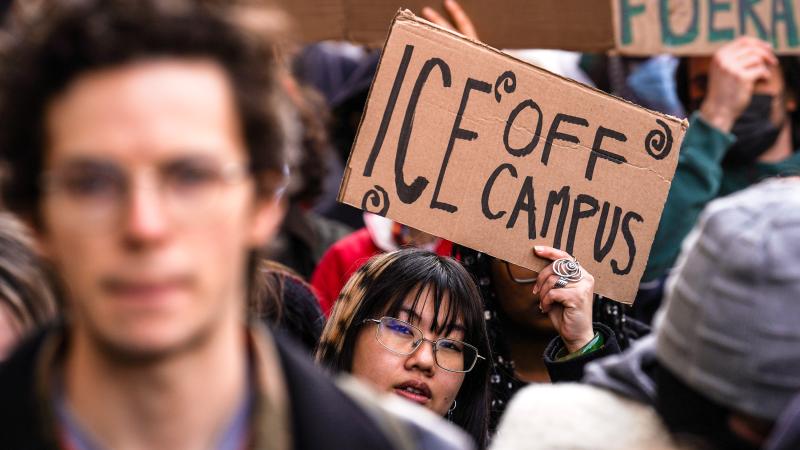With federal worker compensation 30% above median, public employees seek more student loan relief
Critics argue granting union's wish would amount to an unnecessary, politically motivated "bailout."
The country's largest public employees union is pushing the Biden administration to extend rule changes that have drastically increased the number of government workers eligible for federal student loan relief, a move critics charge would not only amount to a "bailout" for an organization that donates almost exclusively to Democrats but also unfairly provide relief to people who make well above the median household income.
The American Federation of State, County, and Municipal Employees (AFSCME) is urging the administration to continue the Public Service Loan Forgiveness (PSLF) temporary waiver, which is set to expire on Oct. 31. The union hopes to get the waiver deadline pushed back until at least July 1 of next year so as many of its members can sign up as possible.
"So many AFSCME members have benefitted from the Biden administration's temporary waiver that expanded eligibility for loan forgiveness," said AFSCME President Lee Saunders in a statement. "But we are only scratching the surface of the need. It is time to extend the deadline and give more public service workers the time to learn about the program, apply for loan forgiveness, and get the relief they need."
The PSLF is a federal government program intended to forgive all student debt for public servants if they first make 120 monthly payments under a qualifying repayment plan.
Last October, the Education Department made changes to the program, including the implementation of the temporary waiver, which allows borrowers to count all payments, regardless of loan program or payment plan, toward loan forgiveness through the PSLF, even ones previously deemed ineligible.
Since the temporary waiver was implemented, more than 164,000 public service workers, including AFSCME members, have seen their federal student loan debt forgiven, according to the union.
The Education Department announced last week that the federal government has approved more than $10 billion in debt relief for over 175,000 borrowers through the PSLF since the changes were implemented.
"Public service workers make incredible sacrifices every day to strengthen their communities — and never more so than during the last two and a half years of this pandemic," said Saunders. "The least we can do is ease their overwhelming student debt burden, much of which they have incurred while getting the skills and education they need to be better at their essential jobs."
According to critics, however, granting AFSCME's wish to extend the waiver would amount to a politically motivated bailout for government employees.
"It's especially outrageous because the AVERAGE [sic] salary and benefits for federal employees is now nearly $100,000 or about 30% more than the median household income," the pro-market Committee to Unleash Prosperity said of extending the waiver in a recent newsletter.
The median household income was $67,521 in 2020, a decrease of 2.9% from the 2019 median of $69,560, according to the U.S. Census Bureau. By comparison, the average federal employee salary is well over $90,000, according to data from the U.S. Office of Personnel Management.
Critics have noted the PSLF overwhelmingly helps borrowers in graduate school, who tend to earn well-above-average lifetime incomes compared to those who received just an undergraduate education or never went to college.
Meanwhile, the program costs taxpayers billions of dollars. Eliminating the PSLF would save an estimated $28 billion for the remainder of the decade, according to the Congressional Budget Office.
Other estimates have calculated that the Biden administration's PSLF waiver would cost the federal government more than $145 billion and presumably be transferred to taxpayers — and that medical doctors could receive an average of about $134,000 in loan forgiveness.
Earlier this month, Republican Reps. Virginia Foxx (N.C.), Jim Banks (Ind.), and Elise Stefanik (N.Y.) introduced a bill that would make a series of reforms to the student loan system, including the elimination of the PSLF, which they argued was intended to be a "limited program" to help public servants but has become "costly and regressive."
Meanwhile, 117 Democrats in Congress — from both the House and the Senate — wrote a letter last week to Education Secretary Miguel Cardona urging him to extend the PSLF waiver through July 2023.
Critics suggested it's not a coincidence that the AFSCME and Democratic lawmakers share the same goal.
"Are you starting to see a pattern here?" the Committee to Unleash Prosperity wrote in its recent newsletter. "The Biden strategy is to bailout all of his political allies and contributors and make taxpayers pick up the tab. It's what Washington calls 'legal graft.'"
Almost all AFSCME political donations have gone to support Democrats or Democratic and liberal organizations in recent years, according to data collected by the OpenSecrets research group.















